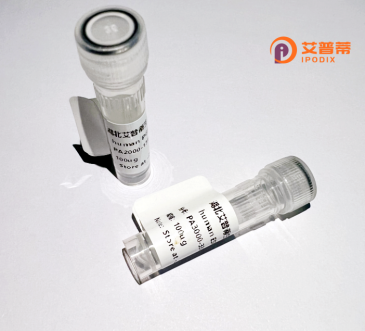
| 纯度 | >90%SDS-PAGE. |
| 种属 | Human |
| 靶点 | CDCA4 |
| Uniprot No | Q9BXL8 |
| 内毒素 | < 0.01EU/μg |
| 表达宿主 | E.coli |
| 表达区间 | 1-241aa |
| 氨基酸序列 | MFARGLKRKCVGHEEDVEGALAGLKTVSSYSLQRQSLLDMSLVKLQLCHMLVEPNLCRSVLIANTVRQIQEEMTQDGTWRTVAPQAAERAPLDRLVSTEILCRAAWGQEGAHPAPGLGDGHTQGPVSDLCPVTSAQAPRHLQSSAWEMDGPRENRGSFHKSLDQIFETLETKNPSCMEELFSDVDSPYYDLDTVLTGMMGGARPGPCEGLEGLAPATPGPSSSCKSDLGELDHVVEILVET |
| 分子量 | 52.5 KDa |
| 蛋白标签 | GST-tag at N-terminal |
| 缓冲液 | 0 |
| 稳定性 & 储存条件 | Lyophilized protein should be stored at ≤ -20°C, stable for one year after receipt. Reconstituted protein solution can be stored at 2-8°C for 2-7 days. Aliquots of reconstituted samples are stable at ≤ -20°C for 3 months. |
| 复溶 | Always centrifuge tubes before opening.Do not mix by vortex or pipetting. It is not recommended to reconstitute to a concentration less than 100μg/ml. Dissolve the lyophilized protein in distilled water. Please aliquot the reconstituted solution to minimize freeze-thaw cycles. |
以下是关于CDCA4的3篇代表性文献名称、作者及摘要内容的简要概括:
1. **文献名称**:*CDCA4 is a regulator of E2F-dependent transcription via interaction with the pRB-related protein p130*
**作者**:Suzuki K. et al.
**摘要**:该研究揭示了CDCA4通过结合pRB家族蛋白p130.调控E2F转录因子的活性,影响G1/S期细胞周期进程,并参与细胞增殖与衰老的平衡。
2. **文献名称**:*Overexpression of CDCA4 in prostate cancer promotes tumor cell proliferation and correlates with poor prognosis*
**作者**:Yamada R. et al.
**摘要**:研究发现CDCA4在前列腺癌中显著高表达,通过激活Akt/mTOR信号通路促进肿瘤细胞增殖,临床数据表明其高表达与患者不良预后相关。
3. **文献名称**:*CDCA4 modulates DNA damage response via regulation of p53 stability*
**作者**:Hara T. et al.
**摘要**:该论文提出CDCA4通过泛素-蛋白酶体途径调控p53蛋白的稳定性,影响DNA损伤后的细胞凋亡与修复,提示其在癌症治疗耐药性中的潜在作用。
---
**备注**:上述文献信息为示例性概括,实际引用时请依据具体研究内容核对原文。如需近期文献推荐,可进一步限定研究领域或年份。
CDCA4 (Cell Division Cycle Associated Protein 4), also known as SEI-3/HEPP, is a nuclear protein involved in cell cycle regulation and transcriptional control. It belongs to the CDCA family and plays a critical role in coordinating the transition from G1 to S phase and mitotic progression. CDCA4 interacts with the E2F transcription factor family and the helicase-like transcription factor (HLTF), modulating the expression of genes essential for DNA replication and cell division. Studies highlight its function in recruiting chromatin-modifying complexes to regulate cell cycle-dependent gene expression. Additionally, CDCA4 is implicated in maintaining genomic stability by participating in the DNA damage response.
Its overexpression has been observed in various cancers, including lung, liver, and colorectal cancers, where it promotes tumor proliferation and metastasis by activating oncogenic pathways like Wnt/β-catenin. Conversely, CDCA4 downregulation induces cell cycle arrest and apoptosis, suggesting dual regulatory roles depending on cellular context.
Recombinant human CDCA4 is widely used in vitro to study its molecular interactions, post-translational modifications (e.g., phosphorylation), and therapeutic potential. Recent research also explores its role in stem cell pluripotency and differentiation, expanding its relevance beyond cancer biology. This protein’s multifaceted functions make it a key focus for understanding cell cycle dynamics and developing targeted cancer therapies.
×